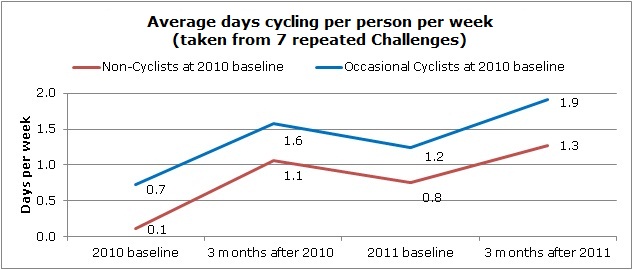The success of our Workplace Cycle Challenges is based on the philosophy that the experience of riding a bike, even for just 10 minutes, is a powerful enough tool to encourage behaviour change. For those who have never ridden or who have had a period of cycling inactivity, this first-hand knowledge or reminder of what it feels like to ride a bike leads to an increase in cycling uptake.
After trying a bike the participant has their own positive personal experience which they can draw upon to at a later stage. But how do we know if they are actually going to continue to cycle or increase their cycling behaviours?
Challenge participants are asked about their cycling behaviour at baseline registration and three months after taking part in a Workplace Cycle Challenge. Longevity in behaviour change is hard to achieve but by using these survey responses from repeat Challenges we are able to plot cycling frequency behaviour data from four time points.
The average trip data from seven Workplace Cycle Challenges has been analysed. Each response segment was re-coded numerically and the following graph shows the change in cycling behaviour amongst 143 non-cyclists and 131 occasional cyclists who logged trips in 2010 and 2011 Challenges. All participants had also completed the three month post-Challenge surveys for each of their Challenges.
Three months after the 2010 Challenge to the start of the 2011 Challenge there was a 28% and 22% drop in cycling frequency amongst those classed as non- and occasional cyclists respectively at the start of the 2010 Challenge.
On average, ten months after taking part in their first Challenge:
- Non-cyclists cycled six times more often
- Occasional cyclists cycled 71% more often
On average, after taking part in two annual Challenges:
- Non-cyclists showed a ten-fold increase in their cycling
- Occasional cyclists showed a 164% increase in their cycling
As Challenge for Change return to previous Challenge cities and regions across the UK in 2012, we look forward to further understanding the positive impact of our programmes over time and the part they play in creating a sustainable future.


